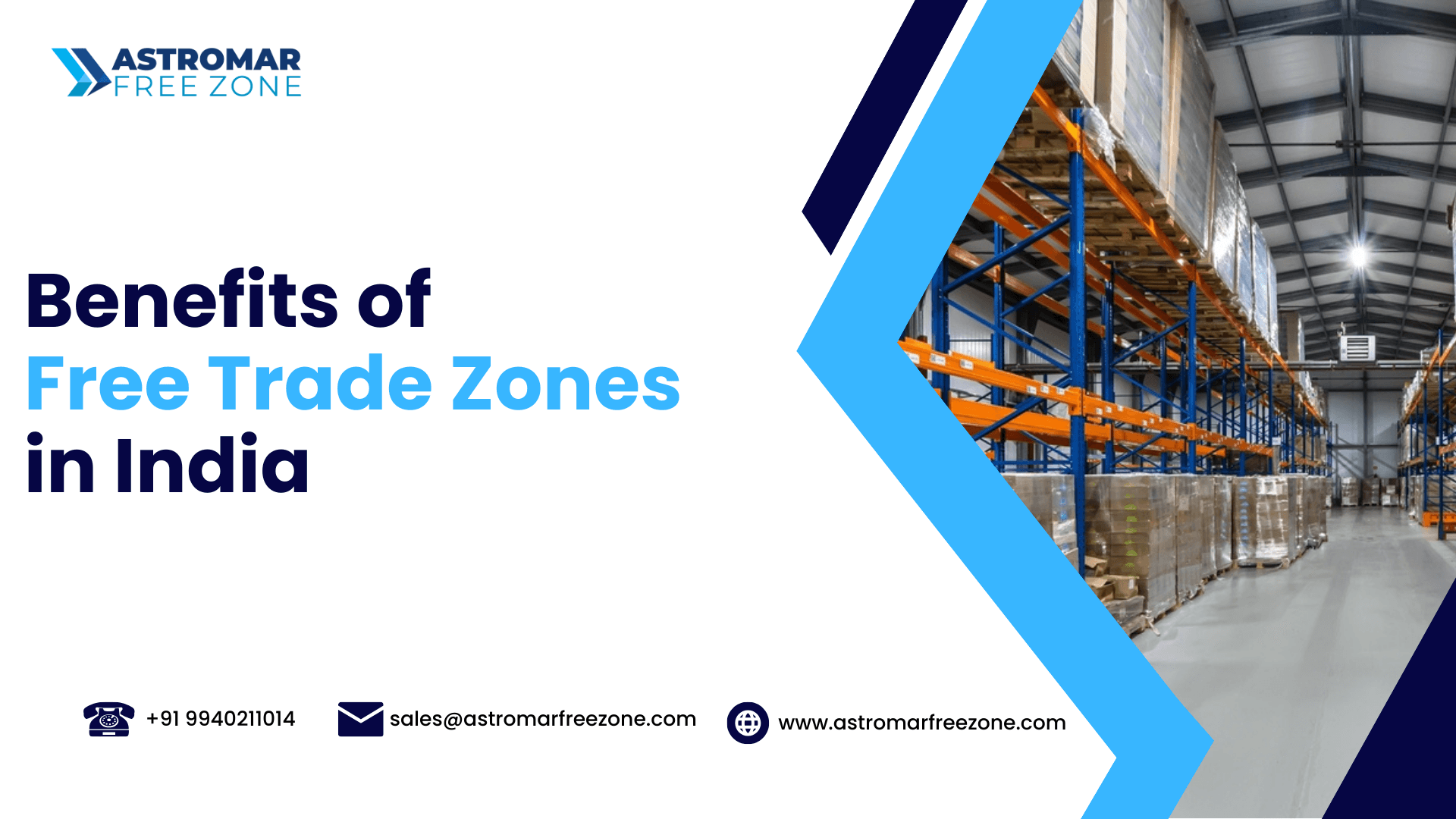


Benefits of Free Trade Zones (FTZs) in India
Free Trade Zones (FTZs) in India, also referred to as Free Trade Warehousing Zones (FTWZs), provide businesses with a range of advantages designed to simplify operations, reduce costs, and boost competitiveness in global markets. Here are the key benefits:
1. Duty-Free Storage and Operations
Goods stored in an FTZ are exempt from customs duties until they enter the domestic market.
Imported goods can be re-exported without paying any duties, reducing costs for global trade.
2. Tax Incentives
Businesses enjoy exemptions on duties, GST, and other taxes for goods stored, processed, or re-exported from the FTZ.
Certain zones offer corporate tax benefits, making them attractive for foreign investors.
3. Simplified Customs Procedures
FTZs streamline customs clearance with minimal documentation and faster processing.
Goods can move between the FTZ and international markets without delays caused by customs assessments.
4. Operational Flexibility
FTZs allow value-added activities such as repackaging, assembly, labeling, and quality checks without incurring additional duties.
Businesses can store goods for extended periods, enabling better inventory management.
5. Improved Cash Flow
Deferred duty payments allow businesses to optimize their cash flow by paying duties only when goods are released into the Domestic Tariff Area (DTA).
Interest-free duty deferral for up to three years in some FTZs further reduces financial strain.
6. Strategic Locations
FTZs in India are situated near major ports, airports, and trade hubs, ensuring faster delivery and lower transportation costs.
This strategic positioning enhances logistical efficiency and market access.
7. Reduced Operational Costs
Lower warehousing costs, tax benefits, and streamlined operations contribute to overall cost savings.
Businesses can avoid the expenses associated with traditional warehousing and customs procedures.
8. Support for Global Trade
FTZs provide the infrastructure and services needed for smooth international trade, including transshipment and consolidation.
They enable Indian businesses to expand globally and foreign companies to access Indian markets seamlessly.
9. Enhanced Infrastructure
FTZs are equipped with modern facilities such as cold storage, automated warehousing, and real-time tracking systems.
Comprehensive support, including logistics and value-added services, ensures efficient supply chain management.
10. Increased Competitiveness
The cost efficiencies, operational flexibility, and tax advantages offered by FTZs allow businesses to stay competitive in global markets.
FTZs enable companies to focus on their core operations while leveraging advanced logistics solutions.
By utilizing Free Trade Zones in India, businesses can streamline their operations, reduce costs, and access international markets efficiently. FTZs are particularly beneficial for industries like manufacturing, e-commerce, automotive, and electronics. For a seamless trade and logistics experience, facilities like Astromar Free Trade Warehousing Zone offer comprehensive solutions tailored to diverse business needs
Benefits of Free Trade Zones (FTZs) in India
Free Trade Zones (FTZs) in India, also referred to as Free Trade Warehousing Zones (FTWZs), provide businesses with a range of advantages designed to simplify operations, reduce costs, and boost competitiveness in global markets. Here are the key benefits:
1. Duty-Free Storage and Operations
Goods stored in an FTZ are exempt from customs duties until they enter the domestic market.
Imported goods can be re-exported without paying any duties, reducing costs for global trade.
2. Tax Incentives
Businesses enjoy exemptions on duties, GST, and other taxes for goods stored, processed, or re-exported from the FTZ.
Certain zones offer corporate tax benefits, making them attractive for foreign investors.
3. Simplified Customs Procedures
FTZs streamline customs clearance with minimal documentation and faster processing.
Goods can move between the FTZ and international markets without delays caused by customs assessments.
4. Operational Flexibility
FTZs allow value-added activities such as repackaging, assembly, labeling, and quality checks without incurring additional duties.
Businesses can store goods for extended periods, enabling better inventory management.
5. Improved Cash Flow
Deferred duty payments allow businesses to optimize their cash flow by paying duties only when goods are released into the Domestic Tariff Area (DTA).
Interest-free duty deferral for up to three years in some FTZs further reduces financial strain.
6. Strategic Locations
FTZs in India are situated near major ports, airports, and trade hubs, ensuring faster delivery and lower transportation costs.
This strategic positioning enhances logistical efficiency and market access.
7. Reduced Operational Costs
Lower warehousing costs, tax benefits, and streamlined operations contribute to overall cost savings.
Businesses can avoid the expenses associated with traditional warehousing and customs procedures.
8. Support for Global Trade
FTZs provide the infrastructure and services needed for smooth international trade, including transshipment and consolidation.
They enable Indian businesses to expand globally and foreign companies to access Indian markets seamlessly.
9. Enhanced Infrastructure
FTZs are equipped with modern facilities such as cold storage, automated warehousing, and real-time tracking systems.
Comprehensive support, including logistics and value-added services, ensures efficient supply chain management.
10. Increased Competitiveness
The cost efficiencies, operational flexibility, and tax advantages offered by FTZs allow businesses to stay competitive in global markets.
FTZs enable companies to focus on their core operations while leveraging advanced logistics solutions.
By utilizing Free Trade Zones in India, businesses can streamline their operations, reduce costs, and access international markets efficiently. FTZs are particularly beneficial for industries like manufacturing, e-commerce, automotive, and electronics. For a seamless trade and logistics experience, facilities like Astromar Free Trade Warehousing Zone offer comprehensive solutions tailored to diverse business needs
Benefits of Free Trade Zones (FTZs) in India
Free Trade Zones (FTZs) in India, also referred to as Free Trade Warehousing Zones (FTWZs), provide businesses with a range of advantages designed to simplify operations, reduce costs, and boost competitiveness in global markets. Here are the key benefits:
1. Duty-Free Storage and Operations
Goods stored in an FTZ are exempt from customs duties until they enter the domestic market.
Imported goods can be re-exported without paying any duties, reducing costs for global trade.
2. Tax Incentives
Businesses enjoy exemptions on duties, GST, and other taxes for goods stored, processed, or re-exported from the FTZ.
Certain zones offer corporate tax benefits, making them attractive for foreign investors.
3. Simplified Customs Procedures
FTZs streamline customs clearance with minimal documentation and faster processing.
Goods can move between the FTZ and international markets without delays caused by customs assessments.
4. Operational Flexibility
FTZs allow value-added activities such as repackaging, assembly, labeling, and quality checks without incurring additional duties.
Businesses can store goods for extended periods, enabling better inventory management.
5. Improved Cash Flow
Deferred duty payments allow businesses to optimize their cash flow by paying duties only when goods are released into the Domestic Tariff Area (DTA).
Interest-free duty deferral for up to three years in some FTZs further reduces financial strain.
6. Strategic Locations
FTZs in India are situated near major ports, airports, and trade hubs, ensuring faster delivery and lower transportation costs.
This strategic positioning enhances logistical efficiency and market access.
7. Reduced Operational Costs
Lower warehousing costs, tax benefits, and streamlined operations contribute to overall cost savings.
Businesses can avoid the expenses associated with traditional warehousing and customs procedures.
8. Support for Global Trade
FTZs provide the infrastructure and services needed for smooth international trade, including transshipment and consolidation.
They enable Indian businesses to expand globally and foreign companies to access Indian markets seamlessly.
9. Enhanced Infrastructure
FTZs are equipped with modern facilities such as cold storage, automated warehousing, and real-time tracking systems.
Comprehensive support, including logistics and value-added services, ensures efficient supply chain management.
10. Increased Competitiveness
The cost efficiencies, operational flexibility, and tax advantages offered by FTZs allow businesses to stay competitive in global markets.
FTZs enable companies to focus on their core operations while leveraging advanced logistics solutions.
By utilizing Free Trade Zones in India, businesses can streamline their operations, reduce costs, and access international markets efficiently. FTZs are particularly beneficial for industries like manufacturing, e-commerce, automotive, and electronics. For a seamless trade and logistics experience, facilities like Astromar Free Trade Warehousing Zone offer comprehensive solutions tailored to diverse business needs






